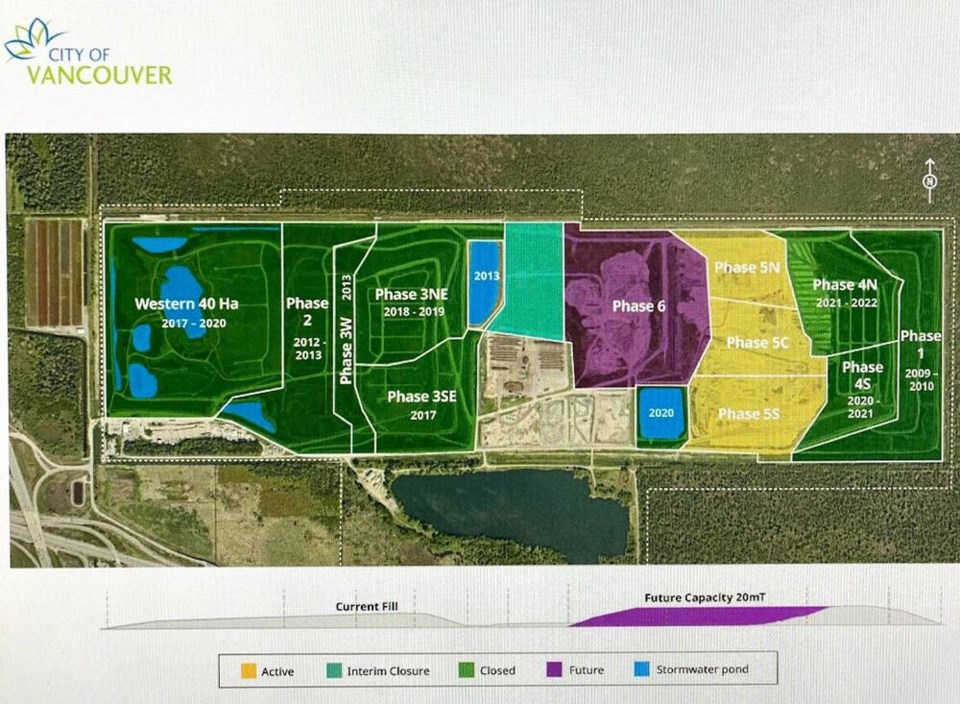Metro Vancouver continues to work on updating its Solid Waste Management Plan, which includes how much more waste can be diverted from the landfill in Delta.
Last updated more than a decade ago, the new plan would be aimed at identifying opportunities to further advance waste reduction and recycling, reduce greenhouse gas emissions.
The plan is “supported by robust engagement and technical studies.”
A regional district report notes Metro recently concluded an idea generation phase, which included research and engagement for the development of potential strategies and actions.
A draft plan is anticipated to be provided to Metro’s Zero Waste Committee and Greater Vancouver Sewage and Drainage District (GVS&DD) in 2026 for consideration, prior to submission to the Minister of Environment and Parks.
Meanwhile, the latest Vancouver Landfill Annual Report was recently made public by the City of Vancouver, which owns and operates the dump located next door to Burns Bog.
Noting that, to date, a total of 126.8 hectares have been progressively closed, representing 56 per cent of the 225-hectare landfill footprint, the report provides a series of figures on such things as types of waste, recycling numbers, landfill gas control, compost and leachate and stormwater management.
The landfill is authorized to accept up to 750,000 tonnes of municipal solid waste for disposal each year.
However, materials used beneficially, such as for cover, road building and closure, are not counted toward that annual discharge limit. In 2024, 733,196 tonnes of waste were disposed at the landfill, the report notes.
Vancouver is responsible to pay for closure and post-closure costs for Vancouver and Delta waste, and those percentages are reviewed and adjusted annually.
At the end of 2024, 39 per cent of the total waste in place at the landfill was regional waste, with the remaining 61 percent originating from Vancouver and Delta.
As far as the closure plan for the site, which includes an operational area within perimeter ditches as well a pond and perimeter buffer, the plan continues to be a full closure of the dump.
In 1999, Vancouver, Vancouver and Delta entered into a new long-term agreement whereby the operational life was extended to 2037.
Garbage would be permitted to be piled higher on the existing footprint and by 2037 the site is to be transferred to Delta.
A 200-hectare area of undeveloped land, known as Parcel 2, that was part of the original landfill property, was transferred to Delta, the GVS&DD and Metro Vancouver back in 2009.
In 2013, an additional 100-hectare area, known as Lot 9, was transferred to Delta. As of the end of 2024, several phases have been progressively closed with engineered cover systems, including the Western 40 Hectares and Phases 1, 2, 3 and 4. No closure work occurred in 2024, as planned, the report adds.
The report also notes the operational plan over the next 12 months includes completion of filling in an area known as Phase 5 South in preparation for closure in 2025.
As per that 1999 agreement, the current waste capacity of the landfill is defined as 20 million tonnes of municipal solid waste. The remaining capacity, as of December 31, 2024, is 4,228,582 tonnes, which at the current fill rate will be reached in 2030, the report notes.
Meantime, according to the City of Delta’s 2025 Financial Plan, anticipated revenues from landfill royalties is $4,410,000, up $680,000 from 2024. That revenue will cease once the dump closes for good.
A Delta engineering department memo six years ago noted an early closure of the Vancouver Landfill “could have a significant financial impact to Vancouver and Delta.”



